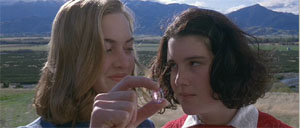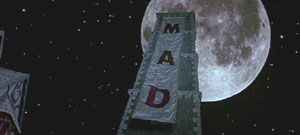|
Seven years before Peter Jackson became a household name (and one of the richest men in New Zealand) with his overwhelmingly successful adaptation of Lord of the Rings, he had created this cult masterpiece that broke from the gross-out approach of his previous works to present an intensely involving account of one of New Zealand's most notorious murder cases: two teenaged girls, Pauline Parker and Juliet Hulme, who formed such an exclusive and insular bond that the threat of separation led them to murder Pauline's mother.  Eschewing the much-publicized and sensationalized trial that followed, Jackson's film focuses instead upon the meeting of the pair and the friendship they developed in the years leading up to the crime. Though the initial sequence, a flash-forward to the immediate aftermath of the killing, leaves no doubt as to the ultimate destination of the narrative, we are at first loath to believe that such a terrible ending could ever follow such a benign starting point. The girls are unusually bright and creative, and their times together evoke giddily nostalgic memories of the exuberance and joy of being young and full of life. The film shows a great deal of sympathy for its protagonists, and even their proclamations of "we have decided how sad it is for others that they cannot appreciate our genius" leave one smirking bemusedly rather than wanting to put them in their place for such smugness and arrogance. We literally see the girls' fantasy life come alive before us as it did with them, immersing us completely in the world they ultimately felt such need to protect (a world which included a religion based upon then-celebrities such as Mario Lanza and James Mason, an elaborate world-building excercise involving the royal family of the fictional country of Borovnia, and a hormonally-charged love-hate relationship with Orson Welles, whose life-size clay likeness wreaks imagined bloody vengeance upon those not in their favor.) Nevertheless, trouble eventually befalls paradise, and as both girls grow increasingly distant from their families, they grow ever more towards one another, a relationship considered potentially "unwholesome" by both sets of parents. As one watches the events unfold, it becomes disturbingly clear that someone needed at some point to be grabbed and warned "do NOT keep going where you're going!" but exactly who needed to be so informed isn't really clear; no one here is completely innocent or guilty, no one root cause is to blame, and the film inexorably pulls us towards its final and most disturbingly powerful achievement: the depiction of murder as the most horrible and upsetting thing imaginable, which, after the countless screen deaths most of us have seen in our lives, is nothing less than amazing. The direction here is superb, with the camera careening wildly about with all the boundless energy of its young subjects and the oft-unanticipated jump into the fantasy world portraying Pauline and Juliet's increasing detachment from reality. Jackson's attention to detail is exemplary, with many scenes being filmed in the actual buildings and rooms that the real-life events occurred in, including Juliet's home, Pauline's psychiatrist's office, the girls' classrooms at Christchurch Girls' School, and the eatery wherein Pauline's mother has her last slice of pie. The fact that Pauline's voice-over dialogue is drawn straight from the real Pauline's journals gives an even greater insight into the disturbing place that is the mind of one who, outwardly rather normal and even sympathetic, also possesses "no qualms of conscience" about matricide.  Despite its subject matter, the film never pronounces any judgement of its own upon its subjects, leaving that in the hands of the audience. It gives us the story in great detail and with great emotion, and then confident that its job is done, leaves us to decide on our own what we feel, without any Titanic-esque epilogue wherein Bill Paxton reminds us, in case we didn't notice all the death and horror, that the sinking of the boat was a sad thing. Interestingly, the real-life Juliet Hulme, who became a successful novelist under the name Anne Perry (who writes murder mysteries; make what you will of THAT,) has publicly asserted that there was never any homosexual aspect to her friendship with Pauline, though the journal entries we hear seem to be pretty clear on the subject. However, it's also true that Pauline writes in her journal, in all seriousness, of passing with Juliet through a portal in the clouds into a paradise called the Fourth World, and therefore one must admit that it's possible that the writings of her journal are a representation of Pauline's ideal world rather that her actual one. In the end, it's hard to know what to feel after watching this story. Was the girls' ultimate fate justice or tragedy? Is the closing credits' use of Mario Lanza's "You'll Never Walk Alone" meant to be sincere or ironic? Is it ever possible to forgive such an act under any circumstances? And is 'love conquering all' really a good thing, be it true or not? -Review by Matt Murray
|
|
||||||||